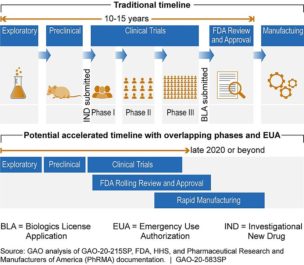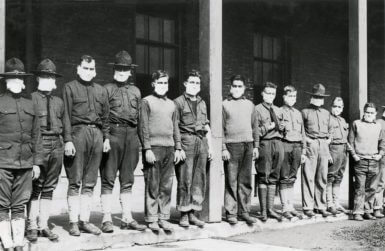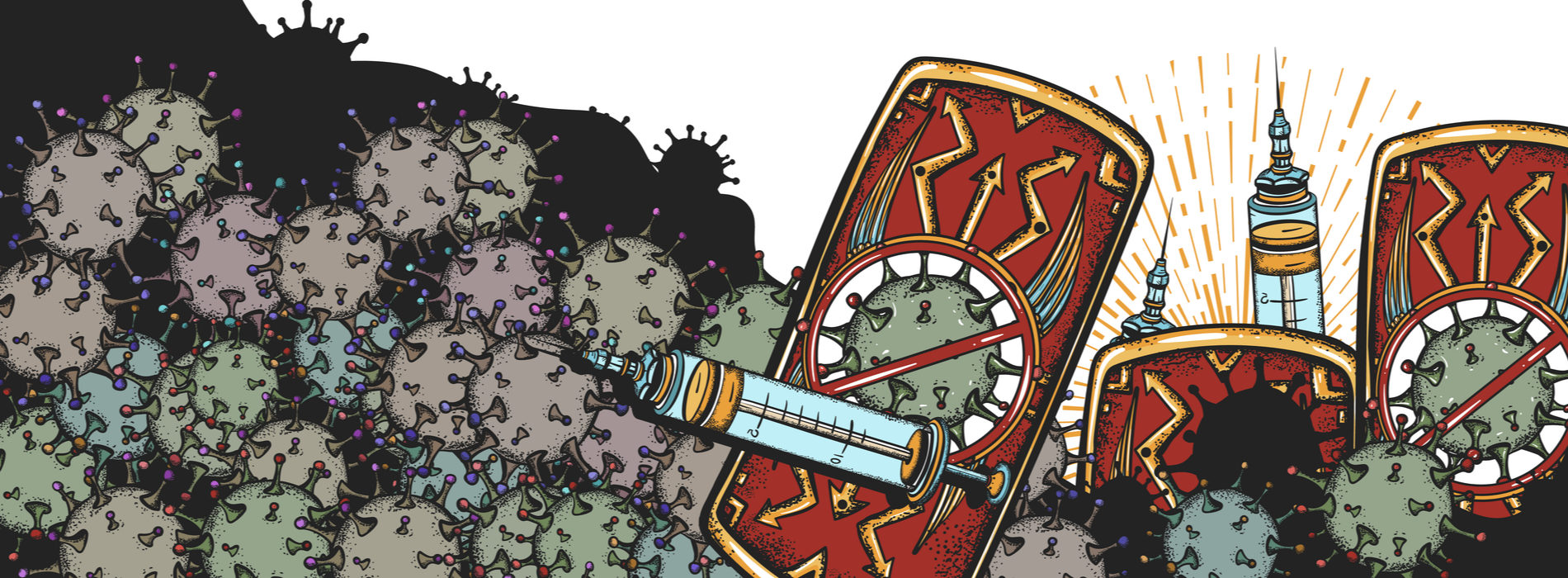The Vaccine Race: Will Public Health Prevail over Geopolitics?
Geopolitical issues have played a key role in the Covid-19 crisis, especially in the production of a Covid-19 vaccine. Whereas the US approach has generally been “America First”, China and many European countries have made bold commitments to global vaccine access. However, countries and firms have conflicting interests regarding both a vaccine’s production and its distribution
Equitable access to health technologies has seldom been such a central global public concern. The development of safe, effective medicines for Covid-19 is seen as necessary to fully and safely restore economic and social activity in all countries. But who will get them first? From a public health perspective, ensuring that all countries can get rapid access to a Covid-19 vaccine is essential to getting the pandemic under control, saving lives and alleviating suffering.
Yet from a geopolitical perspective, drugs and vaccines for Covid-19 have become a strategic asset – one that can affect a country’s place in the global pecking order, and an object of fierce competition. Media reports that the US government tried to acquire a German vaccine developer in March sparked outrage in Europe, as did comments from French firm Sanofi that first dibs on its vaccines would go to the US market. Switzerland has tasked its military with securing vaccines for the country.
The tension between cooperative public health versus competitive geopolitical imperatives is playing out in the race to develop these health technologies and secure access to them. The strategic manoeuvrings of a wide cast of players highlights how science, industrial capacity and non-state actors are shaping the global order.
BEYOND THE US-CHINA RIVALRY: EUROPE IN THE MIDDLE – OR AT THE HEAD OF THE PACK?
It is tempting to see the geopolitics of Covid-19 as a simple zero-sum game in the long-running US-China rivalry. Both countries have been hit hard by the virus, with high numbers of cases nationally, significant economic and domestic political repercussions and a loss of reputational standing globally. Both governments have blamed the other, even elevating conspiracy theories by accusing each other of manufacturing or planting the virus (an assertion the scientific community has rejected for an absence of evidence). And both countries are in the strongest position to develop and mass produce Covid-19 vaccines. Of the ten vaccine candidates that have progressed the furthest, five are being developed by Chinese institutions, a sixth jointly between Chinese, German and US companies, and the remaining four by US and UK entities.
But understanding how geopolitics shapes our ability to control this virus requires looking beyond US-China dynamics alone. Europe, developing countries, the World Health Organization (WHO) and the pharmaceutical industry are also key players in this complex, multilevel game. Normative authority, reputation and scientific knowledge have become strategic sources of power.
Europe, collectively and through its individual states, has both mediated between the two superpowers and also emerged as arguably the leader of the global pandemic response. In the most substantive act of global cooperation since the outbreak began, the European Union launched a global pledging marathon on 4 May that by June had mobilised EUR 9.7 billion to ensure global access to drugs, diagnostics and vaccines – shooting past its initial EUR 7.5 billion target. While these amounts pale in comparison to domestic economic rescue packages, they overshadow standard levels of spending on global health cooperation. Europe accounted for two thirds of the total, but contributions also came from Asia, Africa, Australia, Latin America, the Middle East and North America.
In contrast to this multilateral effort, the US and China seem to have decided primarily to go it alone. The US, traditionally the single largest funder of global health initiatives, was notably absent from the pledging event. China pledged only EUR 46 million to the EU initiative, while announcing several weeks later it would provide USD 2 billion for the global response (presumably through bilateral channels).

The EU also spearheaded the pivotal World Health Assembly Covid-19 resolution adopted in May. Key provisions include calls for: ensuring globally equitable access to Covid-19 drugs and vaccines, including taking a flexible approach to managing intellectual property rights, a contentious topic for countries with strong pharmaceutical industries such as the US; an inquiry into the animal origins of the outbreak, a sensitive issue for China; and an evaluation of WHO’s response and the tools at its disposal, a US demand that could be delicate for WHO. The ability to hammer out an agreement bridging the concerns of the US, China and the pharmaceutical industry testifies to Europe’s efficacy as a broker of cooperation. Some have argued that US withdrawal from international leadership on the pandemic cedes ground to China. But it is Europe – far more than China – that has so far stepped into the gap.
Developing countries also strongly backed the Covid-19 resolution. Many countries found it nearly impossible to procure diagnostics and masks on the global market in the first months of the pandemic, as larger, wealthier countries outbid them for scarce supplies. Developing countries are deeply concerned they will be last in line for medicines too. In the 2009 H1N1 influenza pandemic, high-income governments secured most of the world’s vaccine supply In the 2009 H1N1 influenza pandemic, high-income governments secured most of the world’s vaccine supply through early purchase commitments, while Australia and Canada restricted vaccine exports until after domestic needs were met. Many LMIC governments have combined their weight through WHO to try to prevent this history from being repeated.
Indeed, despite unprecedented attacks from its most powerful Member State and funder, WHO remains a crucial player. US President Trump has repeatedly accused the organisation of bias towards China, blamed WHO for the scale of the pandemic, and announced he was “terminating” the US relationship with the organisation. But while WHO cannot hit back by publicly criticising Trump, neither has it been passively sitting back taking punches. Rather, it has skilfully shored up political support for its central coordinating role in global efforts to control the pandemic.
The launch in May of the Covid-19 Technology Access Pool, a mechanism initially proposed by Costa Rica and eventually supported by 37 high-, middle- and low-income countries, reflects a politically emboldened WHO. The initiative calls on public, private and non-profit entities to voluntarily pool the knowledge, data and intellectual property needed to manufacture drugs, vaccines and diagnostics. The US made clear it would not participate in any WHO-led initiative. The pharmaceutical industry reacted coolly to the proposal. In the past, opposition from these two quarters would likely have scuttled plans within WHO for such a project entirely. While US attacks and budget cuts harm WHO, this sign of waning American influence suggests that the US does not emerge unscathed.
WHO WILL CONTROL THE VACCINES?
At the World Health Assembly, a steady stream of heads of state – including China’s President Xi, Germany’s Chancellor Merkel, and France’s President Macron – called for any Covid-19 vaccine to be treated as a global public good and made widely and quickly available worldwide. Europe and China made bold commitments to global vaccine access at the highest political levels Notably, the US took an “America First” approach and the UK remained mum, while Europe and China made bold commitments to global vaccine access at the highest political levels. How might these speeches translate into reality?
For China’s producers, some of which are state-owned and have benefited from large amounts of public investment, political leaders can probably decide whether and how much vaccine supply is shared outside the country’s borders. A regulatory nod from WHO or a stringent regulatory authority will be important to reassure many countries that vaccines from China meet international standards of safety and efficacy. If this test is met and volumes can be ramped up, the fastest way to access vaccines for many developing countries may be from China.
 Army Hospital No. 4. Fort Porter, New York, during the Spanish influenza pandemic of 1918-1919
Army Hospital No. 4. Fort Porter, New York, during the Spanish influenza pandemic of 1918-1919For Western firms and governments, the question of who will control vaccine access is more complex. Prior to the pandemic, multinational pharmaceutical firms were on the defensive in Europe and North America for steadily increasing the prices of novel medicines beyond what health systems could bear. Covid-19 posed a tough choice for the industry: to rehabilitate its public reputation by delivering much-needed innovation at an affordable price worldwide, or to go for windfall earnings, as the financial markets expect, raising accusations of pandemic profiteering. Leaders of several large firms have tried to walk a fine line between the two. The heads of GlaxoSmithKline, Johnson & Johnson, Pfizer and Sanofi, for example, have committed to making vaccines available at cost while the pandemic persists. But they have not agreed (nor have Chinese firms) to transfer technology or patents to enable the large-scale manufacturing needed to meet global demand, nor to share their data and scientific findings to accelerate overall scientific progress, both of which have been called for by the WHO technology pool. It remains to be seen how other firms will react.
But while Western industry will hold (at least some of) the vaccines, governments and foundations hold the purse strings. Over USD 7 billion of public and philanthropic money has been poured into Covid-19 R&D worldwide, two-thirds for vaccines and the remainder for drugs, diagnostics and other technologies.Over USD 7 billion of public and philanthropic money has been poured into Covid-19 R&D worldwide Governments collectively are expected to spend billions more to build the plants that will manufacture vaccines in some cases, and to purchase the final products, i.e. they are de-risking and subsidising each step of the process from R&D to production. Funders have been ambivalent about requiring that private firms transfer technology or cap prices as a condition of receiving such subsidies. If a government sees domestic vaccine production capacity as a strategic asset, transferring the technology to the potential benefit of a rival is not a priority; if a firm threatens to take their technology to produce elsewhere, governments will hesitate to demand pricing commitments. Governments are holding the purse strings loosely.
The question of when different countries will get access to a vaccine – and when this pandemic will truly end – will be answered by the outcome of this clash of public and private, geopolitical and health interests. While the public health strategy is clear – get vaccines as quickly as possible to as many as possible – geopolitics will likely stretch this pandemic far longer than need be.
